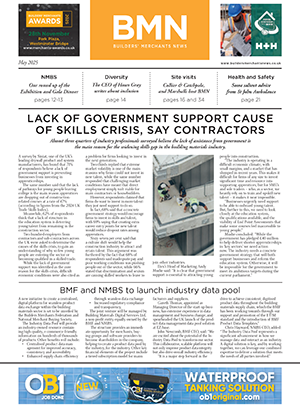This report was first published in Builders' Merchants News December 2010/January 2011 issue.
Nigel Gamble, commercial director of national merchant PTS says the industry expects greater emphasis to be on renewable products. “The industry continues to wait for more detail on various government initiatives and incentives which could have a big impact on demand and buying trends such as the increased interest in solar PV due to the well-received Feed-in Tariff.
be on renewable products. “The industry continues to wait for more detail on various government initiatives and incentives which could have a big impact on demand and buying trends such as the increased interest in solar PV due to the well-received Feed-in Tariff.
“PTS will be continuing its work to make energy efficient technology a more practical and realistic option for installers by opening Renewable Specialist branches that will make sourcing these products much simpler, with the availability that you would expect for standard items.
“Government spending cuts are certain to have a detrimental effect on our industry, as will the increase in VAT from January. Both are negatives, when compared to a year ago, when the Boiler Scrappage Scheme stimulated much new business in the first half of 2010.
“The industry will have to be more ‘creative’ to generate additional sales for a morediscerning consumer base watching where they spend their money.”
 Steve Durdant-Hollamby, commercial director of water management specialist ACO, says looking for bright spots on the construction horizon is not an easy task at the moment. “But just last year our industry was in a similar position and, as it turned out, overall results for 2010 were better than expected. So, is it likely that 2011 will see this repeated?”
Steve Durdant-Hollamby, commercial director of water management specialist ACO, says looking for bright spots on the construction horizon is not an easy task at the moment. “But just last year our industry was in a similar position and, as it turned out, overall results for 2010 were better than expected. So, is it likely that 2011 will see this repeated?”
He believes there are reasons to be more positive. “We know that significant budgets do still exist, and in certain sectors these are set to increase.
“The key to success, certainly in the drainage sector, will lie in delivering value. To do this, contractors, designers and specifiers will be looking to work with merchants and suppliers who are committed to both service and innovation.”
ACO will continue to drive its concept of value engineering across every surface water management application in 2011. This is embodied in its new eight-stage approach to system development, ‘The Water Management Cycle’. This model speeds product selection and ensures the optimum value solution is delivered. By following the key stages, each solution a merchant develops for a customer will draw maximum benefit from ACO’s expertise and its new generation of products and design support services,” Mr Durdant-Hollamby explains.
Drainage and lintels company, Naylor Industries’ chief executive Edward Naylor thinks there’s a t ough year ahead. “Housebuilding will continue to struggle as a result of inadequate mortgage lending and a reduction in public sector activity will also start to bite. We’re beefing up our export activities to cover the potential reduction in domestic trade,” he says.
ough year ahead. “Housebuilding will continue to struggle as a result of inadequate mortgage lending and a reduction in public sector activity will also start to bite. We’re beefing up our export activities to cover the potential reduction in domestic trade,” he says.
Heavyside building products supplier Hanson is expecting cement, concrete and aggregate volumes to fall, but only slightly, while bricks and blocks are set to benefit from an upturn in private sector housebuilding.
 According to national marketing manager Paul Lacey: “The one product line causing concern is asphalt, where falls of between 10 and 15% are expected as the Government spending cuts begin to bite following last year’s fiscal stimulus work.
According to national marketing manager Paul Lacey: “The one product line causing concern is asphalt, where falls of between 10 and 15% are expected as the Government spending cuts begin to bite following last year’s fiscal stimulus work.
“This will mean some plants will have to be closed, with a possible knock-on effect on dry stone production.
“Our road surfacing contracting division will also have to be resized to fit the predicted order book. However, these changes will only affect a small percentage of the workforce. The overriding aims for 2011 are to provide stability and job security for the majority and to secure price increases across the product range to cover rising input costs, particularly energy.”
H+H, one of the largest manufacturers of aircrete systems is also expecting another challenging year. Managing director Mark Oliver says: “With no signs of an increase in the availability of first-time buyer  mortgages, sales of new houses are likely to remain depressed and this will keep build rates at their current historic low levels.
mortgages, sales of new houses are likely to remain depressed and this will keep build rates at their current historic low levels.
“With the withdrawal of HomeBuy Direct and Kickstart Schemes, we could see even less housebuilding than in 2011 than 2010.
“However, I am more optimistic about the RMI market than most industry forecasters.
“In an illiquid housing market, with little opportunity to move and deterred by stamp duty,I think more homeowners that have jobs and are enjoying very low levels of mortgage repayments will consider building extensions. This is why H+H is providing merchants with information to help them advise builders of the Celcon Block solid and cavity wall extension solutions.”
 John Sinfield, Knauf Insulation’s managing director – northern Europe, also believes that 2011 will be tough economically as the public sector cuts start to take effect. “The Government will have a battle on its hands to try to contain inflation while not stopping any recovery,” he says.
John Sinfield, Knauf Insulation’s managing director – northern Europe, also believes that 2011 will be tough economically as the public sector cuts start to take effect. “The Government will have a battle on its hands to try to contain inflation while not stopping any recovery,” he says.
For construction, he believes, housing will once again improve year-on-year, but still with historically low numbers
“There are likely to be some sectors showing growth – commercial and infrastructure will lead the way. Low carbon refurbishment will be a growing sector as the Government starts to get more detail into the Green Deal.
“Energy prices will continue to rise, placing even more emphasis on saving energy,” Mr Sinfield states.
 Michael Beard, sales and marketing director of Superglass Insulation says merchants can take advantage of some opportunities in 2011.
Michael Beard, sales and marketing director of Superglass Insulation says merchants can take advantage of some opportunities in 2011.
“Insulation has a few obvious drivers that make it stand out from other market sectors, namely weather, legislation, the green agenda and UK government energy efficiency policy.
“We have launched ‘Superdad’ to allow UK merchants to take advantage of some of these opportunities to grow business, get new customers through the door and play a part in their local green agenda.”
Mr Beard is adamant that in the merchant sector “we all have a responsibility to remain positive in the face of the challenges the market presents.
Superglass has trebled the size of its external sales team in the last year – how positive is that?”
Tim Deathridge, general manager of Fermacell, manufacture of gypsum fibre board, thinks there has been a sea change in how the merchant sector has approached the market.
a sea change in how the merchant sector has approached the market.
“This will start to reap dividends in the coming year. There has definitely been a shift within all the manufacturers, from producing commodity products with low margins to multi-tasking systems that add value for the end-users.
“These products give merchants the opportunity to offer not only a superior system but also earn higher margins. Merchants aren’t interested in selling plasterboard at £1/m2 any more. They want moisture board, fire board and acoustic board because they know that when the customer uses it once, that’s all they will want to use. Merchants realise they can make more from selling less.
“We have all been guilty in the past of underestimating the commercial acumen of general builders who are now more switched on to the fact that end-users are prepared to pay a premium for a quality solution and that is giving merchants the confidence to stock those products,” Mr Deathridge concludes.
The UK shower market as at November 2010 is still up by 2.2%, selling approximately 2.1 million units a year. However, at the last quarter September-November 2010 compared with the same three months in 2009 the total market is down more than 4%.
The biggest decline is mixer showers which are down more than 7%. Even electric showers, which have held up well in the recent downturn, are now also down more than 2.5%.
 Lorna Fellowes, managing director of Triton Showers says that the spate of bad weather has not helped this market. “Selling up the range is a good way of generating more cash and more cash margin for the business.
Lorna Fellowes, managing director of Triton Showers says that the spate of bad weather has not helped this market. “Selling up the range is a good way of generating more cash and more cash margin for the business.
At Triton we have a complete range of electric, mixer and power showers and there is plenty of scope for selling more stylish designed product, as for example our newly- launched Aspirante range.”
Carl Arntzen, director of heating company, Worcester, Bosch Group, says his  the market as a whole might be best summed up as game of two halves.
the market as a whole might be best summed up as game of two halves.
“Compared to 2009, the first half of the year was almost certainly influenced by the Boiler Scrappage Scheme, as well as the fact that the first half of 2009 was bad in terms of boiler sales,” says Mr Arntzen.
“On the plus side, the recession has shown us that the heating market has not suffered as badly as other areas of the economy. This is probably because boilers aren’t as much of a discretionary purchase as other items.”
Mr Arntzen believes that will probably be flat in terms of market development. “We expect that it will be fairly challenging this year, and at best around about the same volume levels as last year.”






